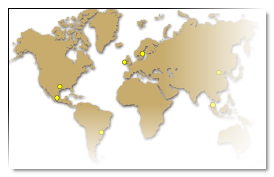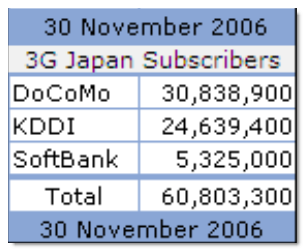China Gears Up for 3G Launch
I was about to write something on the huge 3g investment by the operators and will it live up to its hype? After reading 2 articles by International Herald Tribune, and some comments by Wireless Watch Japan. In the nutshell, IHT claimed that 3g has been overhyped and the investment cost in spectrum and hardware will be hard to turn into profit in the long run - that's from Europen operators perspective. However, WWJ has another idea about this overhype issue, and the author has countered point-by-point what has the Japanese operators done right, that spurred the usage of 3g, manage to turn the technology into something that the end-consumers want to use.

| China Min Says To "Steadily Start" 3G Services In 07- Xinhua Information Technology Minister Wang Xudong said at a national working conference that China should continue the ongoing trials on the application of its homegrown TD-SCDMA technology to ensure a steady start of the 3G services in 2007. Wang's latest remarks, coming weeks after he was quoted by the China Daily as saying 3G licensing will happen "very soon," appear to signal the ministry's sense of urgency on the matter. But his comments that the conditions exist in China for the development of 3G services repeat what some Ministry of Information Industry officials have already said. Xinhua reported Wang as saying China should improve competition in the telecommunications market by allowing fixed-line operators, who face rising competition from mobile carriers, to offer mobile-phone services when the government introduces 3G. Allowing fixed-line carriers to offer mobile-phone services "appears to be very urgent," said Wang, according to the report, which didn't cite a timeframe for the licensing. The country's two key fixed-line operators, China Telecom and China Netcom Group, said earlier this month they expect 3G licensing to happen soon, with China Netcom Chief Executive Zuo Xunsheng saying: "I think it (3G licensing) is going to happen by the end of this year or in the first quarter next year." Wang said the trials on locally developed 3G technology, Time Division Synchronous Code Division Multiple Access, are proceeding smoothly and pave the way for large-scale commercial use of TD-SCDMA. He added that TD-SCDMA has great potential in China's 3G market, according to Xinhua. Analysts say China has delayed issuing 3G licenses in order to give TD-SCDMA time to develop. China has been testing the locally developed technology in five major cities, Beijing, the financial hub of Shanghai, the eastern coastal city of Qingdao, the northern city of Baoding and the southern city of Xiamen, and widened the trials to include more end-users in early November. Wang said the advent of 3G in China will lead to an investment surge and offer opportunities for growth in the whole telecommunications equipment sector, according to the Xinhua report. -By Terence Poon and Victoria Ruan; Dow Jones Newswires; 8610 6588 5848; terence.poon@dowjones.com (END) Dow Jones Newswiressource: read here...
|
 And lately the daily in China has been discussing about the potential gain that the whole country in general and the telecommunication industry in specific will benefit from with the release of 3g license sooner than later (see Who will be winners in China's 3G industry?).
And lately the daily in China has been discussing about the potential gain that the whole country in general and the telecommunication industry in specific will benefit from with the release of 3g license sooner than later (see Who will be winners in China's 3G industry?).
China Unicom, which is operating a CDMA network, will not face much pressures as it is relatively easier for the company to upgrade from the present network to CDMA2000, an international 3G standard.
|
China Mobile would face more risks as it is expected to adopt home-grown TD-SCDMA, which would require huge investment on the networks, said Yi, adding the prospect for TD-SCDMA is still vague.
|





 : 60 millions
: 60 millions 








